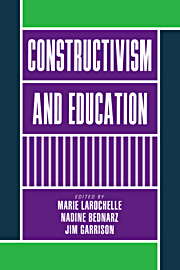Book contents
- Frontmatter
- Contents
- Preface
- List of contributors
- I Introduction
- II From epistemological constructivism to teaching: a variety of views
- 2 Why constructivism must be radical
- 3 An epistemology for didactics: speculations on situating a concept
- 4 Toward a pragmatic social constructivism
- III Teaching within the constructivist mode: practices and promises
- IV The mediating role of teachers and teacher education
- V Conclusion
- Notes
- References
- Index
2 - Why constructivism must be radical
Published online by Cambridge University Press: 04 August 2010
- Frontmatter
- Contents
- Preface
- List of contributors
- I Introduction
- II From epistemological constructivism to teaching: a variety of views
- 2 Why constructivism must be radical
- 3 An epistemology for didactics: speculations on situating a concept
- 4 Toward a pragmatic social constructivism
- III Teaching within the constructivist mode: practices and promises
- IV The mediating role of teachers and teacher education
- V Conclusion
- Notes
- References
- Index
Summary
During the twentieth century, Jean Piaget was in the forefront of the development of constructivism and the struggle to overcome conventional ideas about the acquisition of knowledge. In the course of Western history, most philosophers tackled the following epistemological questions: “What is knowledge? How does one come to know? Can knowledge be certain?” They arrived at their answers using a logic they considered to be universal and independent of human subjects. Piaget broke with this tradition by raising a question which appeared to be simpler and more pragmatic: “How does a child manage to acquire what goes by the name of knowledge?”
In the eyes of his philosophical contemporaries, Piaget's theory of knowledge involves the “genetic fallacy” and is tainted with the sin of “psychologism.” The philosophical establishment therefore feels justified in ignoring the work of that “Genevan dilettante.” For the general public, given Piaget's interest in children, genetic epistemology is merely a somewhat abstract theory for explaining cognitive development – an offshoot of child psychology.
This initial misunderstanding was compounded when Piaget's term constructivism began to be discussed in educational circles. It gave rise to statements such as: “It's obvious, after all, the children don't simply swallow all adult knowledge whole, they have to construct it!” Even today, a good many authors are convinced that they are constructivists, yet they never questioned traditional epistemology. It was their naive interpretation that prompted me to add the qualifier radical to constructivism.
- Type
- Chapter
- Information
- Constructivism and Education , pp. 23 - 28Publisher: Cambridge University PressPrint publication year: 1998
- 22
- Cited by



